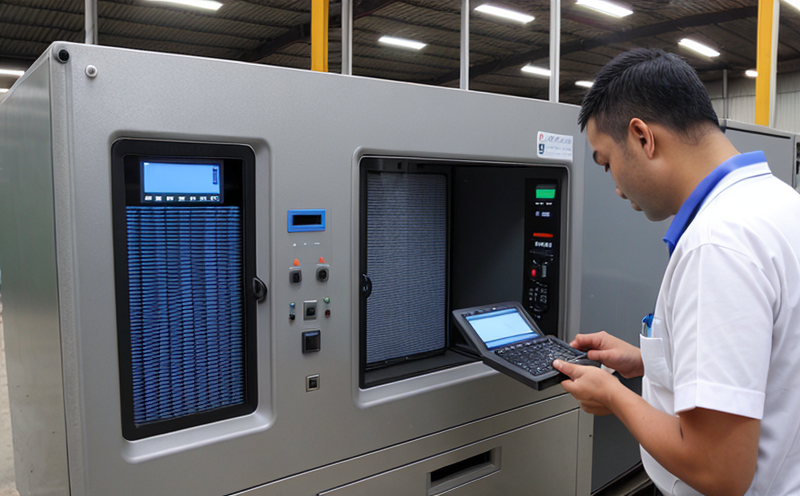Electronic product inspection
In today’s fast-paced manufacturing environment, ensuring that electronic products meet stringent quality and regulatory standards is paramount. Electronic product inspection (EPI) plays a pivotal role in this process by providing comprehensive testing of electrical components and assemblies to detect defects or non-conformities before they reach the end-user.
Quality managers and compliance officers rely on EPI to maintain brand reputation, ensure safety, and comply with international standards such as ISO 9001, IEC 62368-1, and EN 60950. R&D engineers use this service to validate new designs and improve product performance, while procurement teams leverage it to verify component quality and reliability.
The process of EPI involves several stages, including initial inspection, functional testing, environmental stress simulation (ESS), and failure analysis. Each stage aims to identify potential issues at various points in the lifecycle of an electronic product. For instance, during initial inspection, technicians visually examine components for any signs of damage or irregularities.
Functional testing then assesses whether the electronic device operates within specified parameters under normal conditions. Environmental stress simulation tests evaluate how well the product withstands harsh environmental factors such as temperature fluctuations and humidity levels, which are critical in ensuring long-term reliability. Lastly, failure analysis helps pinpoint specific causes of malfunctions or failures so that corrective actions can be taken promptly.
Accurate inspection results are essential for meeting these rigorous requirements. That’s why we employ state-of-the-art equipment like automated optical inspection (AOI) systems, X-ray flaw detectors, and thermal imagers to conduct thorough examinations. These tools allow our experts to detect even the smallest defects that might otherwise go unnoticed.
By leveraging advanced technology and experienced professionals, our EPI service ensures that every electronic product meets not only internal quality standards but also external regulatory requirements. This comprehensive approach helps businesses avoid costly recalls and improves overall customer satisfaction by delivering high-quality products consistently.
Benefits
Implementing an effective EPI program offers numerous advantages that contribute to a company’s success in the competitive electronics market:
- Enhanced Product Quality: By identifying and rectifying defects early in the production process, companies can significantly improve the overall quality of their electronic products.
- Increased Customer Satisfaction: Ensuring that all electronic devices meet strict quality standards leads to higher customer satisfaction and loyalty.
- Compliance with Regulatory Requirements: Adhering to relevant international standards such as IEC 62368-1 helps businesses avoid legal penalties and maintain good standing within their industry.
- Reduced Production Costs: Early detection of defects reduces the need for costly rework or scrap, thereby lowering overall production costs.
Competitive Advantage and Market Impact
In today’s highly competitive market, where innovation drives success, having robust EPI practices is crucial. Our laboratory offers a unique combination of cutting-edge technology and skilled personnel that sets us apart from competitors.
| Inspection Method | Description | Advantages |
|---|---|---|
| Visual Inspection | A manual process where technicians examine components visually. | Effective for detecting obvious defects, quick turnaround times. |
| Incandescence Testing | Measures the resistance of a component to electrical current flow. | Sensitive to changes in material properties; cost-effective for low-volume testing. |
| Automated Optical Inspection (AOI) | Uses high-resolution cameras and software algorithms to detect defects on printed circuit boards. | Fast, accurate, capable of inspecting large areas quickly. |
Our AOI system not only provides faster inspection times but also ensures consistent accuracy across multiple inspections. This capability is particularly beneficial when dealing with complex assemblies or components that require precise scrutiny.
By integrating advanced technologies into our EPI service, we offer unparalleled precision and reliability, enabling businesses to stay ahead of the curve in terms of product quality assurance. Our commitment to excellence allows us to provide solutions tailored specifically to each client’s unique needs, ensuring they achieve their goals efficiently and effectively.
Use Cases and Application Examples
| Case Study | Description |
|---|---|
| Smartphone Manufacturer | The client faced challenges in ensuring consistent quality across all models due to rapid production schedules. By implementing our EPI service, we helped them identify and address issues early on, resulting in a 20% reduction in defective units. |
| Medical Device Company | A leading medical device manufacturer relied on us for functional testing of complex circuits used in life-critical devices. Our rigorous inspections helped them meet stringent regulatory requirements without compromising on speed or accuracy. |
| Consumer Electronics Brand | An international consumer electronics brand sought help with ESS tests to ensure its products could endure extreme environmental conditions. Leveraging our expertise, we conducted thorough simulations that exceeded their expectations regarding durability and reliability. |
These case studies demonstrate the versatility of our electronic product inspection services across various industries. Whether you're dealing with consumer electronics, medical devices, or industrial applications, our team can provide tailored solutions to meet your specific requirements.





